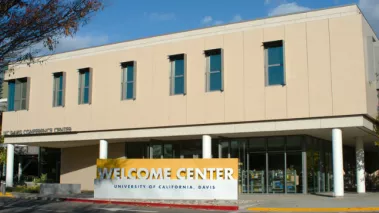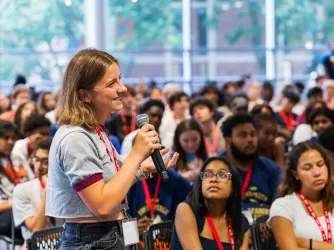Table of Contents
UC Davis to students: You have no right to silence opposing viewpoints

At a time when some college leaders seem wary of vocally supporting free speech on their campuses, University of California, Davis Interim Chancellor Ralph Hexter is making a strong, pro-speech stance a priority. Hexter announced in a Feb. 23 letter to the UC Davis community that he will form a working group of students, faculty, and staff to explore how even controversial expression can have a place at UC Davis.
In his commendable letter, Hexter acknowledged that he hasn’t seen a time when national discourse “was more vitriolic and polarized” than it is today. However, he stands by the First Amendment and its protection of speech — even speech we find abhorrent or disagreeable.
Hexter cites what FIRE calls “disinvitations” as a key problem, in which campus community members who disagree with the views of an invited speaker interfere with the speaker’s presentation so their message can’t be heard, or demand the speaker’s invitation be rescinded altogether. Hexter cites several such attempts at UC Davis, including a 2016 event at which protesters “shouted down and for a time physically blocked the audience from observing a speaker,” and a more recent incident in which “a student club invited a speaker with views abhorrent to many. On this occasion, protesters managed to prevent the orderly entry of ticketed audience members to the lecture hall so that the the speech was cancelled before it could even begin.”
That’s not the appropriate response, Hexter says. And his letter makes clear that he doesn’t believe the way to respond to viewpoints one disagrees with is by silencing them — a response history demonstrates rarely has its desired effect. He believes speech should be countered with more speech.
“We understand that controversial speakers may well inspire protest, and we fully support properly conducted protests,” he writes. “Protesters, too, enjoy free speech protections.”
When protesters passionately debate and discuss ideas rather than silence speakers altogether, rights are protected, more viewpoints are heard, and minds are more likely to be changed. But when protesters try to silence speech, it often brings more attention to censored speaker’s viewpoint.
Just look at what happened with Milo Yiannopoulos on the University of California, Berkeley’s campus. Protesters who shut down Yiannopoulos’ speech turned a campus visit into a national story. Instead of Yiannopoulos having an audience of 500 at UC Berkeley, the censorship attempts made his visit the day’s top story and gained his message an audience of millions around the country.
Hexter reiterates in his letter that “UC Davis is a community for all ideas, and our campus is committed to ensuring that all members are allowed to freely hear, express, and debate different points of view.”
All ideas — not just “nice” ideas, or “easy” ideas, or ideas that don’t ruffle feathers. And that’s important. Most people have no problem with commonly accepted viewpoints. It’s the controversial ones that the First Amendment is intended to protect. Likewise, it’s up to all of us to resist the temptation to silence speech we find vile or repugnant. If our First Amendment rights erode, it will be from the fringes.
FIRE is delighted that Hexter is prioritizing higher education’s role as a place of unfettered debate and expression, and we’re excited to see what the UC Davis working group develops. According to the letter, the group is expected to provide recommendations on how to protect First Amendment rights at UC Davis by the end of May. We hope they come up with a model that protects all speakers.
We encourage other college and university leaders to emulate Hexter’s dedication to preserving free speech rights at UC Davis by following suit on their own campuses.
Recent Articles
FIRE’s award-winning Newsdesk covers the free speech news you need to stay informed.

FIRE’s defense of pollster J. Ann Selzer against Donald Trump’s lawsuit is First Amendment 101

Cosmetologists can’t shoot a gun? FIRE ‘blasts’ tech college for punishing student over target practice video

China’s censorship goes global — from secret police stations to video games
